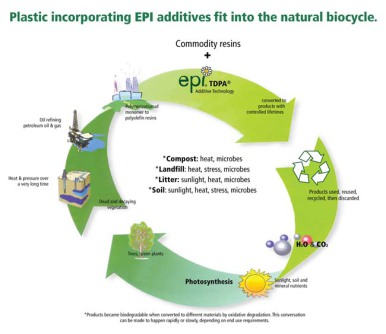Premium Grade Overshoes Made From Oxo-Biodegradable Plastic
**NOW IN STOCK**
Oxo-biodegradable plastic offers a solution to plastic waste that is found in the open environment because it does not just fragment. It biodegrades. The process continues until the material has biodegraded to nothing more than CO2, water, and humus within months. It does not leave fragments of petro-polymers in the soil.
One of the benefits of oxo-biodegradable plastic is that it can be recycled as part of a normal plastic waste stream. However, if the plastic is not collected it cannot of course be recycled, so it needs to biodegrade instead of accumulating in the environment.
It is suitable for “in-vessel” composting at the higher temperatures required by the new EU animal by-products regulations.
If the Overshoes are sent to landfill, the Oxo-biodegradable plastics fragment and partially biodegrade to CO2 and water in the parts of the landfill where oxygen is present. OXO plastics are designed so that they will not degrade deep in landfill and they will not therefore generate methane (a powerful greenhouse gas) in anaerobic conditions.
Only £29.95 plus vat for 500 Oxo-Biodegradable Overshoes
That's just £5.99 per 100 overshoes
PRODUCT DESCRIPTION
-
Premium Grade Overshoe/Shoe Cover (4g)
16" (41cm) Overshoes.
Heat sealed elasticated edges.
Oxo-Bio Plastic CPE deeply embossed for non slip use.
Manufactured & distributed in accordance with PPE Regulation (EU)2016/425 & ISO 13485:2016
Designed for minimal risk applications ensuring a high level of hygiene in many sectors.
All overshoes are Vacuum packed in polybags
Technical Explanation of Oxo-Biodegradable Plastics:
OXO-bio plastic is conventional polyolefin plastic to which has been added small amounts of metal salts, none of which are "heavy metals" which are restricted by the EU Packaging Waste Directive 94/62 Art 11. These salts catalyze the degradation process to speed it up so that the OXO plastic will degrade abiotically at the end of its useful life in the presence of oxygen much more quickly than ordinary plastic. At the end of that process it is no longer visible, it is no longer a plastic as it has been converted via Carboxylation or Hydroxylation to small-chain organic chemicals which will then biodegrade. It does not therefore leave fragments of plastic in the environment. The degradation process is shortened from decades to years and/or months for abiotic degradation and thereafter the rate of biodegradation depends on the micro-organisms in the environment. It does not however need to be in a highly microbial environment such as compost. Timescale for complete biodegradation is much shorter than for "conventional" plastics which, in normal environments, are very slow to biodegrade and cause large scale harm.
Do You Require A Dispenser For Your Overshoes?



















